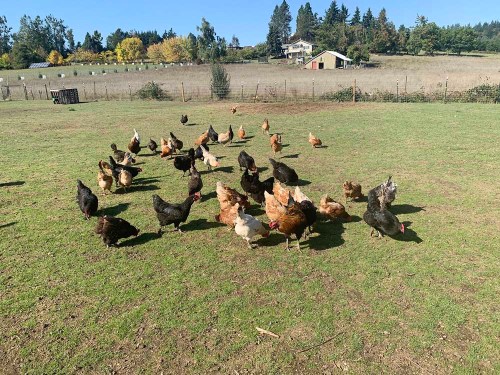Small farm focuses on treating animals humanely
Published 10:30 am Monday, October 18, 2021

- The ChamBurn laying flock is free range and fed a premium non-GMO feed from Mosaic Farms in Corvallis.
OREGON City — Knowing they are feeding people nutritious food that has been raised humanely is important to farmers Paul Chamlies and Jim Wilburn.
“Every one of our animals gets loves every day,” Wilburn said. “Whether it’s breeding stock or not. Our goal is to give it the best life while it’s here with the intention of having it nourish us one day.”
Trending
Their operation, ChamBurn Farm, is on 6.5 acres in Oregon City. They raise pastured lamb and pork, free-range chickens for eggs and meat, as well as alpacas, Katahdin hair sheep and Great Pyrenees livestock guard dogs. Their farm is a member of the Oregon Pasture Network and the Food Animal Concerns Trust, a nonprofit that promotes humanely raised livestock.
Wilburn and Chamlies started as backyard farmers during the summer of 2014. Wilburn said after a few years they became more interested in where their food came from and wanted to expand to a farm of their own.
The name of their farm came from a mash-up of their last names. Although Chamlies said it doesn’t “roll off the tongue,” the name has een how they identify themselves.
ChamBurn Farm practices rotational grazing, and their sheep and alpacas are on a grass/hay-only diet while the chicken and pigs are fed a premium non-GMO feed from Mosaic Farms in Corvallis.
“To me, knowing where my food comes from and what my food eats is two of the primary considerations,” Wilburn said.
Labeling is important to Wilburn, and he said he enjoys educating customers on what labeling is regulated and what is unregulated. He said terms like “uncured” and “all natural” are just nomenclature and the organic label has been diluted.
Trending
“The public is more trusting of non-GMO than organic now, and it’s interesting to talk to people and get their opinion on labeling,” he said.
ChamBurn Farm also holds farm-to-table events and private events on the farm. At those events Wilburn cooks and said that over 90% of the ingredients were grown on the farm.
Going forward, the farm plans to add cooking classes.
One of the most rewarding aspects of the events for them is showing people the process of getting food to the table and watching them enjoy it. One childhood friend told Wilburn that their chicken was “the most chicken-y tasting chicken he ever had.”
They even had one longtime vegetarian leave the farm with $90 worth of chicken.
For Chamlies, who works as a pharmacist — he dubs himself a “farmercist” — said his philosophy has changed a lot since starting the farm because he’s more interested in educating people about their food to prevent them from needing the drugs he prescribes.
“It’s a little ironic that my entire profession revolves around feeding people (drugs),” he said. “But as I’ve learned more about how our food is what actually affects our health, that’s the easiest way to care for yourself so you can avoid having to take pills. … It really starts with food.”









